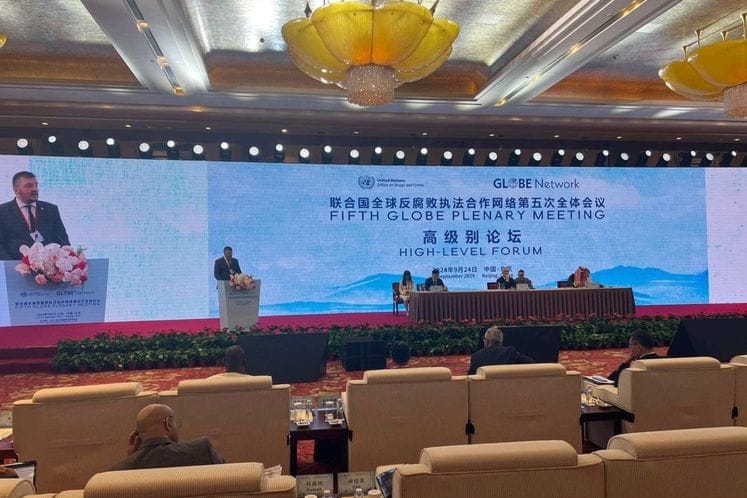- Government of Montenegro
DPM Koprivica participates in the Fifth Plenary Me...
DPM Koprivica participates in the Fifth Plenary Meeting of the GlobE Network

Deputy Prime Minister for Political System, Justice, and Anti-Corruption Momo Koprivica participated in the Fifth High-Level Plenary Meeting organised by the GlobE Network and the United Nations Office on Drugs and Crime (UNODC) in Beijing.
In his address at this anti-corruption conference, Deputy Prime Minister Koprivica emphasised that corruption undermines the principles of law, justice, and equality. It not only hinders economic growth and erodes trust in democracy but also presents a significant security challenge. He stressed that one of the primary responsibilities of the legal system is to establish robust mechanisms to prevent and combat corruption.
Koprivica pointed out that corruption has increasingly become an international and transnational issue, necessitating coordinated global efforts to criminalize both national and international corruption. To achieve this, the legal framework should focus on:
1. Recognising the role of international institutions and bodies, and implementing their standards and recommendations.
2. Establishing strong mechanisms to protect international investment companies from corrupt expropriation and eliminating incentives for bribery and illegal influence.
3. Preventing illicit financial transactions and monitoring "tax havens."
4. Enhancing cooperation and the effective exchange of information between national anti-corruption agencies to detect corruption and unreported income and assets.
5. Limiting immunity for high-ranking public officials in cases of corruption-related offenses.
6. Implementing comprehensive measures and frameworks for financial investigations and the confiscation of assets gained through corruption.
7. Ensuring the safety and freedom of corruption investigators, particularly journalists.
Koprivica highlighted Montenegro’s progress as a candidate for EU membership, noting that the country has made the most significant advancements among candidate nations. Montenegro's achievements in harmonizing its judicial, anti-corruption, and media laws with EU standards, alongside the adoption of a national Anti-Corruption Strategy and measurable results in prosecuting high-level corruption and organised crime—such as actions against senior government, judicial, and police officials—have led to positive reports on the fulfillment of interim benchmarks in Chapters 23 and 24 of the EU accession negotiations. These developments represent a crucial step towards Montenegro’s full EU membership.
He concluded by reaffirming that the fight against corruption is a fundamental goal of Montenegro's state policy, and the country is committed to strengthening international cooperation in this area.
During the conference, Deputy Prime Minister Koprivica held several productive meetings focused on enhancing anti-corruption cooperation and legal frameworks, including discussions with John Brandolino, Director of the UNODC Division of Treaty Affairs, Ferenc Pál Bíró, President of Hungary's Integrity Authority, Slagjana Taseva, Dean of the International Anti-Corruption Academy, and renowned anti-corruption expert Drago Kos.
